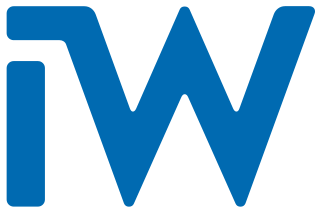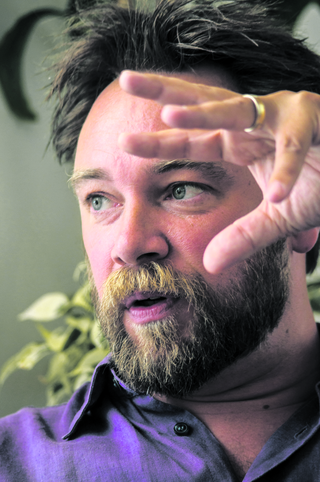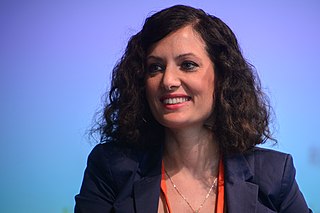
The Goethe-Institut is a non-profit German cultural association operational worldwide with 159 institutes, promoting the study of the German language abroad and encouraging international cultural exchange and relations. Around 246,000 people take part in these German courses per year.

ARD is a joint organisation of Germany's regional public-service broadcasters. It was founded in 1950 in West Germany to represent the common interests of the new, decentralised, post-war broadcasting services – in particular the introduction of a joint television network.

The German Economic Institute (IW) is a private economic research institute in Germany, which promotes a liberal economic and social order. The German Economic Institute is based in Cologne, Germany, with additional offices in Berlin, Germany, and Brussels, Belgium.

The Berlin-Brandenburg capital region is one of the most prolific centers of higher education and research in the world. It is the largest concentration of universities and colleges in Germany. The city has four public research universities and 27 private, professional and technical colleges (Hochschulen), offering a wide range of disciplines. Access to the German university system is tuition free.

Carl Henrik Fredriksson is a Swedish literary critic, columnist, essayist, and translator living in Vienna, Austria. For fifteen years, until March 2015, he was the editor-in-chief of the European cultural journals network Eurozine, which he co-founded in 1998. Between 1998 and 2001, he was the editor-in-chief of Sweden's oldest cultural journal Ord&Bild, where he had worked as an editor since 1995.

Martin Hans Sonneborn is a German politician and Member of the European Parliament (MEP). He is a founder and federal chairman of Die PARTEI. He was editor-in-chief of the satirical magazine Titanic from 2000 to 2005 and works for Spiegel Online and ZDF.

Lutz Hachmeister is a German media historian, award-winning filmmaker and journalist. He particularly gained international attention for directing the 2005 film The Goebbels Experiment, co-produced by the BBC and the Canadian History channel, and featuring Kenneth Branagh as the narrator for the Goebbels Diaries. In 2006 Hachmeister established the Institute for Media and Communication Policy (IfM) in Berlin and Cologne, which is strongly tied to the Anglo-American media scene.
Paul Johannes Kevenhörster is Professor Emeritus of Political Science at the Westphalian William's University of Muenster in Germany. His work focuses on politics in Japan, municipal government and international development co-operation. He has served in academia as well as in a government agency and as consultant to a variety of organisations. Since 1966 Paul Kevenhörster is married to Gisela Drerup. They have three daughters, Uta, Eva and Ina, three granddaughters and a grandson, Milla and Emma Kevenhörster, Sophie and Lucas Russell.

Bernd Hüttemann has been serving as Secretary-General of the European Movement Germany since 2003. Hüttemann is also a European policy advisor to the German Catholic Bishops' Conference and a lecturer at the Jean Monnet Chair of European Politics at the University of Passau.
Stefan Fröhlich is a German political scientist and professor for International Relations at the Friedrich-Alexander-University Erlangen-Nuremberg. The emphasis in his work is on German foreign policy, transatlantic relations and US foreign policy, European foreign and security policy, and International Political Economy.

Caroline Y. Robertson-von Trotha is a Scottish sociologist and cultural scientist, working in Germany.
The League of West German Communists was a Maoist communist political organization in the Federal Republic of Germany, active between 1980 and 1995 and one of the last surviving "K Groups" established in the aftermath of the German student movement. Following the German reunification, it merged into the Party of Democratic Socialism.

Böhlau Verlag is a book and magazine publisher predominantly of humanities and social science disciplines, based in Vienna and Cologne, with a branch in Weimar. They describe their focus as being "from the historically oriented humanities". The publishing house was an independent and privately owned media corporation until it was acquired by Vandenhoeck & Ruprecht in 2017.
Asiem El Difraoui is a political scientist, economist, and documentary director and producer of Egyptian-German descent. He focuses primarily on topics related to the Arab world, and is widely considered as a leading expert on Arab media in general and jihadism internet propaganda in particular.
Wolfgang Theodor Wessels is a German political scientist. He holds the Jean Monnet Chair ad personam in political science, is a retired professor at the University of Cologne, and the head of the Centre for Turkey and European Studies (CETEUS) at the University of Cologne.

The Konrad Wolf Film University of Babelsberg is the oldest and largest film school in Germany. The university offers undergraduate, graduate, as well as post-graduate studies in all fields of the process of filmmaking. In addition, it is the only art school in Brandenburg, situated together with the Babelsberg Film Studio in Babelsberg.

Robin Curtis is a Canadian film and media scholar and cultural critic who is based in Germany. She currently holds the Chair in Media and Cultural Studies at the Albert-Ludwigs-Universität Freiburg, where she also chairs the department of Media and Cultural Studies.

Naika Foroutan is a German social scientist.
Thomas Knaus is a German educational scientist. He is a Professor of Educational Science specializing in Media Education and Head of Department of Media Pedagogy. at The Ludwigsburg University of Education and Honorary Professor for Educational Informatics at the Faculty of Computer Science & Engineering at the Frankfurt University of Applied Sciences. He also work as an Academic Director of the FTzM in Frankfurt am Main. He served as professor of Pedagogy at the University of Erlangen-Nuremberg as well as a visiting professor at the University of Otago, at the University of Sydney (Australia) and at the University of Vienna (Austria). Before his academic career Knaus worked as a teacher and a media educator in extracurricular youth work in Frankfurt am Main and Bad Homburg.













